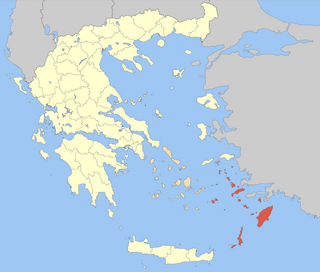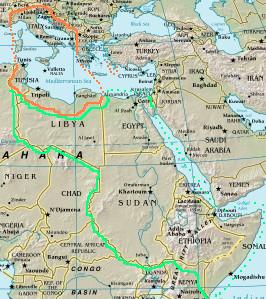Related Research Articles

The Dodecanese are a group of 15 larger plus 150 smaller Greek islands in the southeastern Aegean Sea and Eastern Mediterranean, off the coast of Turkey's Anatolia, of which 26 are inhabited. This island group generally defines the eastern limit of the Sea of Crete. They belong to the wider Southern Sporades island group.

Karpathos, also Carpathos, is the second largest of the Greek Dodecanese islands, in the southeastern Aegean Sea. Together with the neighboring smaller Saria Island it forms the municipality of Karpathos, which is part of the Karpathos regional unit. Because of its remote location, Karpathos has preserved many peculiarities of dress, customs and dialect, the last resembling those of Crete and Cyprus. The island has also been called Carpathus in Latin and Scarpanto in Italian.

Leros is a Greek island and municipality in the Dodecanese in the southern Aegean Sea. It lies 317 kilometres from Athens's port of Piraeus, from which it can be reached by an 9-hour ferry ride or by a 45-minute flight from Athens, and about 20 miles to Turkey. Leros is part of the Kalymnos regional unit. The island has been also called in Italian: Lero.

The Battle of the Mediterranean was the name given to the naval campaign fought in the Mediterranean Sea during World War II, from 10 June 1940 to 2 May 1945.

Rhodes is the principal city and a former municipality on the island of Rhodes in the Dodecanese, Greece. Since the 2011 local government reform it is part of the municipality Rhodes, of which it is the seat and a municipal unit. It has a population of approximately 50,000 inhabitants. Rhodes has been famous since antiquity as the site of Colossus of Rhodes, one of the Seven Wonders of the Ancient World. The citadel of Rhodes, built by the Hospitalliers, is one of the best-preserved medieval towns in Europe, which in 1988 was designated as a UNESCO World Heritage Site.

During World War II, Operation Accolade was a planned British amphibious assault on Rhodes and the Dodecanese Islands in the Aegean Sea. Advocated by the British Prime Minister, Winston Churchill, as a follow-up to the capture of Sicily in 1943 from Operation Husky, it was cancelled on 25 December 1943 to focus on the assault on Anzio. The allies did not, then, gain all of the Dodecanese. Most notably, the Germans still had possession of Rhodes. The operation in the Dodecanese, though, kept many German troops occupied in the area.

The Battle of Leros was the central event of the Dodecanese campaign of the Second World War, and is widely used as an alternate name for the whole campaign. After the Armistice of Cassibile the Italian garrison on the Greek island Leros was strengthened by British forces on 15 September 1943. The battle began with German air attacks on 26 September, continued with the landings on 12 November, and ended with the capitulation of the Allied forces four days later.

The Italian Islands of the Aegean were a group of twelve major islands in the southeastern Aegean Sea, that—together with the surrounding islets—were ruled by the Kingdom of Italy from 1912 to 1943 and the Italian Social Republic from 1943 to 1945. When the Kingdom of Italy was restored, they remained under formal Italian possession until they were ceded to Greece in 1947.

The Dodecanese campaign of World War II was an attempt by Allied forces to capture the Italian Dodecanese islands in the Aegean Sea following the Armistice with Italy in September 1943, and use them as bases against the German-controlled Balkans. Operating without air cover, the Allied effort was a costly failure, the whole of the Dodecanese falling to the Germans within two months. The Dodecanese campaign, lasting from 8 September to 22 November 1943, resulted in one of the last major German victories in the war.

The Battle of Kos was a brief battle in World War II between British/Italian and German forces for control of the Greek island of Kos, in the then Italian-held Dodecanese Islands of the Aegean Sea. The battle was precipitated by the Allied Armistice with Italy. German forces with strong air support quickly overwhelmed the Italian garrison and the recent British reinforcements, denying the Allies a base to attack the German presence in the Balkans and leading to the expulsion and death of the island's Jewish population.

Imperialism, colonialism and irredentism played an important role in the foreign policy of Fascist Italy. Among the regime's goals were the acquisition of territory considered historically Italian in France and Yugoslavia, the expansion of Italy's sphere of influence into the Balkans and the acquisition of more colonies in Africa. The pacification of Libya (1923–32), the invasion of Ethiopia (1935–36), the invasion of Albania (1939), the invasion of France (1940), the invasion of Greece (1940–41) and the invasion of Yugoslavia (1941) were all undertaken in part to add to Italy's national space. According to historian Patrick Bernhard, Fascist Italian imperialism under Benito Mussolini, particularly in Africa, served as a model for the much more famous expansionism of Nazi Germany in Eastern Europe.

Operation Abstention was a code name given to a British invasion of the Italian island of Kastelorizo (Castellorizo) off the Turkish Aegean coast, during the Second World War, in late February 1941. The goal was to establish a motor torpedo-boat base to challenge Italian naval and air supremacy on the Greek Dodecanese islands. The British landings were challenged by Italian land, air and naval forces, which forced the British troops to re-embark amidst some confusion and led to recriminations between the British commanders for underestimating the Italians.

The Italian colonial empire, known as the Italian Empire between 1936 and 1943, began in Africa in the 19th century and comprised the colonies, protectorates, concessions and dependencies of the Kingdom of Italy. In Africa, the colonial empire included the territories of present-day Eritrea, Somalia, Libya, and Ethiopia; outside Africa, Italy possessed the Dodecanese Islands, Albania, and had a concession in China.
Italian colonists were settled in the Dodecanese Islands of the Aegean Sea in the 1930s by the Fascist Italian government of Benito Mussolini, Italy having been in occupation of the Islands since the Italian-Turkish War of 1911.

Rhodes Maritsa Airport is a military air base located on the island of Rhodes in Greece. The airport is located 14 km south west of the capital city of Rhodes, near the village of Maritsa, and 3 km south of the new Rhodes International Airport.

The Levant Schooner Flotilla was an Allied naval organisation during World War II that facilitated covert and irregular military operations in the Aegean Sea from 1942–1945. It was primarily organised by the British Royal Navy and consisted of a series of commandeered caïques, or local schooners, manned by British sailors, special forces, and Greek volunteers.

HMS Hurworth was a Second World War Type II Hunt-class escort destroyer of the British Royal Navy. She spent most of her career in the Mediterranean. She was lost to a mine in the Aegean Sea in 1943.

The Raid on Symi also known as Operation Tenement took place from 13 to 15 July 1944 as part of the Mediterranean Campaign in World War II. The action was a combined operation conducted by two Allied special forces, the British Special Boat Service and the Greek Sacred Band, who raided the German and Italian garrisons at the island of Symi in the Aegean Sea.
References
- ↑ Chant, Christopher (1 January 1986). The Encyclopedia of Codenames of World War II. Routledge & Kegan Paul. pp. 123–. ISBN 9780710207180.